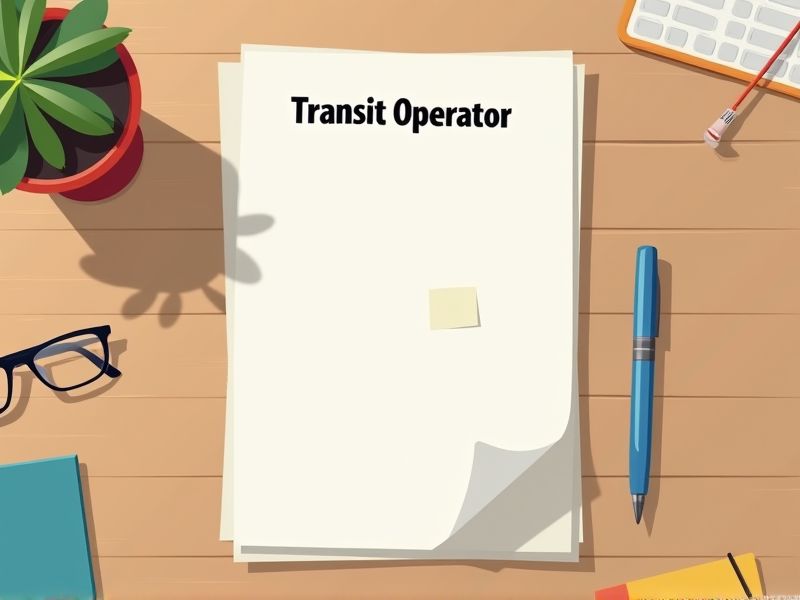
Transit operators play a critical role in ensuring public transportation runs safely and efficiently, demanding a deep understanding of vehicle operations and passenger safety. Certifications validate a candidate's ability to navigate complex transit systems and manage unexpected situations. These credentials enhance trust with employers and passengers, offering reassurances of professionalism and expertise. Explore these essential certifications for aspiring transit operators.
Commercial Driver's License (CDL) with Passenger Endorsement
The necessity for a Commercial Driver's License (CDL) with a Passenger Endorsement arises because it certifies the operator's ability to safely transport passengers. This endorsement ensures the driver possesses the skills and knowledge to handle passenger buses, which often have different mechanics and safety features compared to standard vehicles. Regulatory compliance is another factor, as federal and state laws mandate such endorsements for operating vehicles designed to transport a certain number of passengers. The endorsement helps to minimize liability and risk for transit companies by ensuring their operators are adequately trained and certified.
Transit Operations Certification
Transit Operations Certification ensures operators possess the essential skills and knowledge to manage complex transit systems efficiently. This certification improves safety by reducing the likelihood of accidents caused by human error. Operators with certification often demonstrate higher job satisfaction and performance, leading to increased service quality. Certification helps transit agencies meet regulatory and industry standards, fostering public trust and compliance.
First Aid/CPR Certification
A transit operator regularly interacts with the public, increasing the likelihood of witnessing medical emergencies, hence necessitating First Aid/CPR certification to provide immediate assistance. The ability to perform CPR can significantly enhance survival rates in cases of cardiac arrest during transit. Being equipped with first aid skills helps operators manage minor injuries effectively, minimizing further harm until professional medical care is available. Certification ensures that transit operators are prepared to handle unexpected health crises, ensuring passenger safety and confidence.
Defensive Driving Certification
Defensive Driving Certification equips transit operators with skills to anticipate and react to road hazards, reducing accident risks. Enhanced driver awareness and decision-making are crucial in ensuring passenger safety within a public transport setting. Certification often leads to lower insurance premiums for transit agencies due to improved safety records. Trained operators contribute to public trust and satisfaction by consistently delivering safe and reliable transportation services.
Emergency Vehicle Operator Course (EVOC) Certification
The EVOC Certification equips transit operators with the necessary skills to handle emergency situations safely, reducing the likelihood of accidents. By training operators in defensive driving techniques, the certification increases overall passenger safety during potential road hazards. State and federal regulations often mandate such certifications to ensure public transport operators are fully prepared for high-pressure scenarios. Without this certification, transit operators might lack the crucial training needed to effectively manage risks associated with operating large vehicles.
Safety Management Certification
Safety Management Certification is required for transit operators because it enhances their ability to identify and mitigate potential hazards, reducing accident rates. The certification process equips operators with standardized procedures and knowledge to handle emergencies effectively. Regulatory bodies often mandate safety certifications to ensure compliance with legal and safety standards. Enhanced safety management fosters public trust in transit systems, contributing to increased ridership and community satisfaction.
Vehicle Inspection Certification
Vehicle Inspection Certification is vital for ensuring the safety of passengers and operators, as it verifies that transit vehicles meet safety standards. Compliance with these inspections can prevent accidents and reduce the risk of mechanical failures. Regular inspections contribute to the longevity of vehicles, decreasing maintenance costs over time. Regulatory bodies often mandate these certifications to maintain public trust in public transportation systems.
Customer Service Excellence Certification
Customer Service Excellence Certification equips transit operators with the skills to handle diverse passenger needs, fostering a more inclusive transportation experience. Enhanced customer service leads to increased rider satisfaction, which can result in higher ridership and subsequent revenue growth. The certification also instills a sense of professionalism and accountability among employees, which reduces staff turnover. Effective customer service practices directly contribute to safety and efficiency, essential for the smooth operation of transit systems.
ADA Compliance Certification
Transit operators require ADA Compliance Certification to ensure accessibility for all passengers, especially those with disabilities. This certification results in adherence to legal requirements under the Americans with Disabilities Act, reducing the risk of legal penalties and potential lawsuits. It enhances the usability of services, leading to increased ridership and customer satisfaction. Accessibility features certified by ADA also foster inclusivity, improving the public image and reputation of the transit operator.
Emergency Response Training Certification
Emergency response training certification for transit operators enhances safety by equipping them with the skills to manage crises effectively. Knowledge of emergency procedures reduces accident-related injuries and fatalities. Public confidence in transit services increases when operators possess certified training. Trained operators can minimize damage and operational disruptions during emergencies.
Summary
By earning certifications, you signal to employers an enhanced level of expertise and commitment in the transit field. This perceived reliability leads to increased job opportunities and potential advancements in career roles. Organizations may trust you with more responsibilities, knowing they are backed by certified proficiency. Consequently, the transit system could experience improved efficiency and rider satisfaction through your certified skills.
